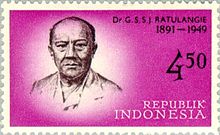Sam Ratulangi
Once in Batavia (now Jakarta), he had a change of heart and decided to attend the technical high school Koningin Wilhelmina.
[5] Ratulangi graduated in 1908 and started work on railroad construction in the south Priangan area of West Java.
[7] He arrived in Amsterdam in 1912 and continued his studies that he started in Java, which had been cut short due to his mother's illness.
In 1913, he received a certificate to teach middle school level mathematics (Middelbare Acte Wiskunde en Paedagogiek).
[9] At the advice of Mr. Abendanon, a Dutchman who was sympathetic[Note 2] to those from Indonesia or what was called Indië at the time, Ratulangi applied and was accepted to the University of Zurich in Switzerland.
[11] During his time in Amsterdam, Ratulangi frequently met with Sosrokartono (R.A. Kartini's brother) and the three founders of the Indische Party, Ernest Douwes Dekker, Tjipto Mangoenkoesoemo, and Soewardi Soerjaningrat.
He invited speakers who were sympathetic to the Indonesian cause, such as Conrad Theodor van Deventer and Jacques Henrij Abendanon.
[15] After three years of teaching, he moved to Bandung and started the insurance company Assurantie Maatschappij Indonesia with Roland Tumbelaka, a medical doctor by profession and fellow Minahasan.
He was also instrumental in the opening the areas of Modoinding and Kanarom in south Minahasa for transmigration and the establishment of a foundation to support the education of students with financial needs.
[19] The existence of this party representing a specific region of Sulawesi gave its members local identity, but it also served the purpose of promoting national unity.
[21] Appointed to the People's Council Volksraad in 1927 to represent the constituents in Minahasa, Ratulangi continued to agitate for equal rights and advocating Indonesian nationalism by aligning himself with the Nationalist Caucus (Fraksi Kebangsaan) that was started by Mohammad Husni Thamrin.
He was a co-sponsor of the Soetardjo Petition, which expressed the desire for political autonomy through gradual reforms within a ten year period.
[24] In 1932, Ratulangi was one of the founding members of the United Scholars of Indonesia (Vereniging van Indonesische Academici).
[28] He used the magazine to write opinions against the colonial government's unfair actions and also to make his fellows Indonesians aware of the current state.
[30] Because all political organizations were disbanded, Ratulangi participated in the relief effort of the families of Dutch Colonial army (KNIL or Koninklijk Nederlands Indisch Leger) soldiers.
[31] In 1944, he was transferred to advise the military government in Makassar in South Sulawesi, which was part of the eastern territory that was controlled by the Japanese Navy.
[32] In June 1945, Ratulangi established an organization called Source of People's Blood (SUDARA or Sumber Darah Rakyat).
[33] In early August 1945, Ratulangi was appointed as one of the members of the Preparatory Committee for Indonesian Independence (PPKI or Panitia Persiapan Kemerdekaan Indonesia) from Sulawesi.
Ratulangi had already arrived in Batavia with the other PPKI appointees from the eastern territory for meetings and hence he was present during the proclamation ceremony.
[37] The Allied Forces under the command of Australian Brigadier General Ivan Dougherty arrived in September 1945 with the appointment as Military Governor.
With all the foreign influx, the local youth in Sulawesi were prepared to fight at all costs to maintain Indonesian independence.
[38] In addition, Ratulangi received support from the local traditional chiefs (raja-raja) including from the Sultanate of Bone and the Kingdom of Luwu who pledged their allegiance to the newly established Republic.
[44] They were transferred to Surabaya and then escorted to the demarcation line near Mojokerto and Jombang where they made their way to the capital of the republic in Yogyakarta.
[49] The first point of the manifesto reads: That the struggle, which is now being fought out by the Republic of Indonesia does not only involve the material, mental, moral, and political essentials of that part of the Indonesian people limited to the Republic of Indonesia, but also the national freedom and national dignity of the whole Indonesian people and the recognition of the fundamental rights of that people to live as a free and independent nation, on the soil and on that part of the world, which the Almighty God bestowed on them.
Wulan Rachel was the first Indonesian woman to receive the hulpacte basic certificate for elementary education in Dutch in 1912.
Main artery roads in all cities in Minahasa (Bitung, Manado, Tomohon, and Tondano) are named after Ratulangi.









